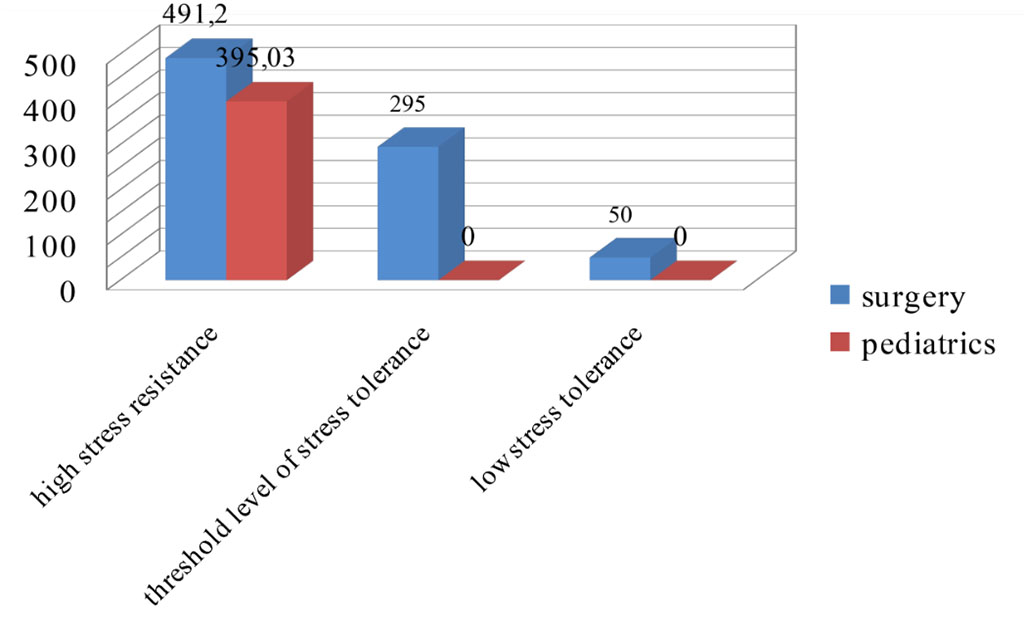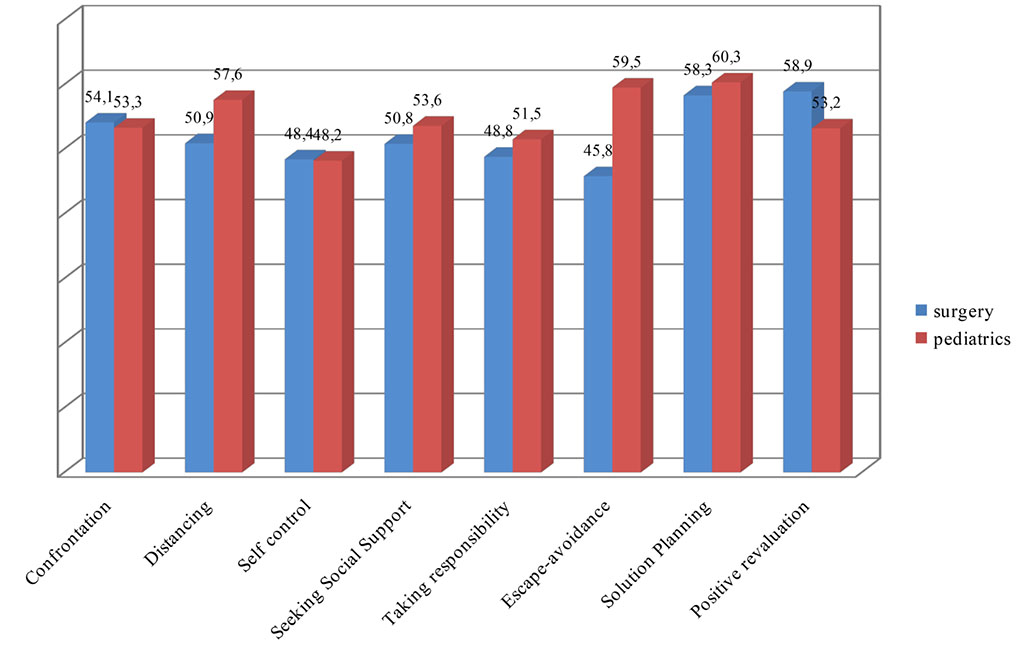- Home
- About the Journal
- Peer Review
- Editorial Board
- For Authors
- Reviewer Recognition
- Archive
- Contact
- Impressum
- EWG e.V.
Cite as: Archiv EuroMedica. 2022. 12; 6: e1. DOI 10.35630/2022/12/6.2
The article presents the results of an empirical study of the level of stress resistance and coping strategies in first-year medical residents in surgical and pediatric specialties. The problem of adaptation of a young specialist during the period of training in residency to medical practice is relevant, since during this period the correctness of the chosen medical specialty and the career path of a specialist are assessed. As a result of our study, data were obtained on a high level of stress and low adaptation in the residents. Among surgical residents, stress levels are significantly higher. Preferred coping strategies among surgical residents are decision-making and positive reappraisal. Pediatric residents have predominance of escape-avoidance and decision-making coping strategies. The obtained data on the psychological status of medical residents at the initial stage of their career path enabled us to develop a program of psychological support, including diagnosis and training aimed at reducing stress and developing effective behavioral strategies.
Keywords: stress tolerance; social adaptation; coping strategy; surgical residents; pediatric residents; transition from medical school to residency; social adaptation; psychological support
The problem of adaptation of a young medical graduate during the period of training in residency to medical practice is relevant, since during this period the correctness of the chosen medical specialty and the professional path of a specialist are assessed. It is important to note that it is this period of professional development that professional adaptation takes place [2]. Under professional adaptation is meant the process of entry of the individual into the professional environment and profession, as well as ways of interacting with the professional environment [4]. Professional adaptation includes several stages, and a doctor studying in residency, i.e. medical residents, because they are simultaneously trained at the Department of Postgraduate Education and work in the hospital under the supervision of a specialist doctor. According to Anisenkov D.A. [1] successful professional adaptation implies that the resident has specific professional skills and the opportunity and time for self-realization. Professional adaptation largely depends on the professional theoretical base, on the level of training, as well as on his personality traits [9; 13]. At the initial stage of professional adaptation, young specialists are more prone to burnout syndrome, since in this period residents experience excessive emotional stress and high responsibility [3]. Slesarenko L.A. [10] found in his study that pronounced disadaptation, passive behavior and psycho-emotional stress are from 3 to 16% in medical residents of the first year at Tver Medical University. Nakvasina S.N. [7] notes in her work the need for the implementation of psychological seminars and trainings, which are aimed at overcoming psychological and organizational barriers in graduates. In addition, Zhukov S.V., Derbenev D.P., Plyukhin A.A. [5] introduced the "Program for assessing the quality of adaptation of a young doctor to work." There is a need to improve medical education, namely, the improvement of the educational process with various categories of trainees, including the training of residents [11, 12]. Therefore, the successful completion of the professional development in medical residents also depends on how correctly the specialist chose his medical specialty and the level of stress resistance, adaptive potential and behavioral strategies. The obtained results of the study of data on the psychological status of clinical residents at the initial stage of professional activity made it possible to develop a program of psychological support, including diagnosis and training aimed at reducing stress levels and developing effective behavioral strategies.
The aim of the study: to assess level of stress resistance and coping strategies in first-year residents of the surgical and pediatric specialties and to create a psychological support program for diagnosis and training aimed at reducing stress levels and developing effective behavioral strategies.
The study involved medical residents of the first year in pediatric specialty (in the amount of 40 people) and surgical (in the amount of 28 people) at Astrakhan State Medical University (Russia). The clinical base for surgical residency is the Postgraduate Training Department of Surgical Diseases with course of coloproctology; for pediatric residency - the Department of Hospital Pediatrics with course of postgraduate education. Psychodiagnostic examination was carried out using the following methods: 1) measuring stress tolerance and social adaptation by the Holmes and Rahe stress scale (Russian adaptation by N.E. Vodopyanova) to determine the presence or absence of stress (less than 150, a greater degree of stress resistance; 150-199 - high; 200-299 – threshold; 300 and lower) [8]; 2) Questionnaire "Methods of Coping Behavior" by R. Lazarus and S. Folkman (Russian adaptation by T.L. Kryukova, E.V. Kuftyak, M.S. Zamyshlyaeva) [6]. This technique is used by psychologists to identify coping strategies, mechanisms for overcoming difficulties in various areas of mental activity. Coping with difficult situations, as the authors of the questionnaire believe, is a constantly changing cognitive and behavioral effort. The authors sorted out the following coping strategies: confrontational coping, distancing, self-control, seeking social support, accepting responsibility, avoidance-escape, problem solving planning, and positive reassessment. This technique is considered to be the first standard questionnaire that can measure coping. For data processing, the Mann-Whitney U-test and the SPSS Statistics 21.0 program were used. The results of the study are presented in figures and tables.
In order to measure the current state of stress resistance and social adaptation, the method for determining stress resistance and social adaptation by T. Holmes and H. Rage (Russian Adaptation by N.E. Vodopyanova) was used (Figure 1). Since the study involved first-year residents of various medical profiles, the measurement of adaptive potential is very important. As a result of a psychodiagnostic study, data were obtained on a high level of stress and low adaptation in residents of both surgical and pediatric profiles - 491.2% and 395.03%. These results indicate a high emotional stress and stress load, this is due to new professional conditions. It should be noted that work-related stress in medicine almost tops the list. The level of stress is higher in surgical residents in comparison with pediatric residents, since 7 pediatric residents demonstrated low stress resistance. Among the surgical residents there was no person with a low level of stress resistance. The obtained results show the need of psychological support programs for medical residents. More successful transition into the professional environment will allow to optimize the psycho-emotional state and reduce the risk of burnout and the development of psychosomatic diseases.

Figure 1. Average values of stress resistance and social adaptation according to the Holmes and Rahe stress scale in clinical residents (compiled by the authors based on the research materials)
Analysis of the results interpretation was carried out using Lazarus and Folkman model of coping (Russian adaptation by T.L. Kryukova, E.V. Kuftyak, M.S. Zamyshlyaeva) revealed the following data (Figure 2). The preferred coping strategies for surgical residents are decision-making (58.9%). Moreover, this coping mechanism indicates a pronounced preference for the appropriate strategy among residents. Coping planning and problem-solving is adaptive coping, as it allows to purposefully and systematically solving of current problems, taking into account past experience and the availability of both external and internal resources. The coping “Positive reassessment” (58.3%) scored a high indicator, which, of course, is an adaptive behavioral coping that allows you to positively rethink problem situations, to look at them differently.
In pediatric residents, the prevalence of copings "Escape-avoidance" (57.6%) and "Decision planning" (60.3%), since the values occupy the position of the upper version of the norm. Non-adaptive coping mechanism "Escape-Avoidance" was found in clinical residents of the Pediatric Faculty.

Figure 2. The average values of "Methods of Coping Behavior" by R. Lazarus and S. Folkman in medical residents (compiled by the authors based on the research materials)
This mechanism reduces psycho-emotional stress only temporarily, in the short term, but solves problems completely and leads to even greater accumulation of psycho-emotional stress and stress. In other words, the use of a non-adaptive coping mechanism of clinical residents of the Pediatrics specialty, along with a high level of stress, increases the likelihood of neurotic conditions and psychosomatic disorders, and leads to maladjustment in the professional environment.
The use of the Mann U-criterion made it possible to identify the significance of differences between psychological indicators in residents of different medical profiles (Table 1).
Table 1. Significant differences between the two groups of clinical residents
| The name of the scales according to the methods of coping behavior | Significance level of differences according to the Mann-Whitney U-test | Differences in statistical significance (p) |
| flight-avoidance | 0,002 | p⩽0,001 |
(compiled by the authors based on the research materials)
From Table 1, we can see that there were significant differences between clinical residents of different specialties in the behavioral strategy "Flight-Avoidance" (p ⩽ 0.001). Residents in the specialty "Pediatrics" prefer to deny or ignore the problem, avoiding the responsibility assigned to them.
Thus, psychological difficulties were identified during the professional adaptation of medical residents. In particular, the use of a non-adaptive coping mechanism of clinical residents in the specialty "Pediatrics" along with a high level of stress. Residents of the specialty "Surgery" had a high stress score, however, they choose adaptive behavioral strategies.
The most effective direction in solving the problems of professional adaptation of medical residents is psychological support. Psychological support program includes psychological diagnosis, which enables to identify the current psycho-emotional state and behavioral strategies. Thus, a “risk group” among medical residents with a high level of stress is detected, as well as non-adaptive coping strategies that can be employed. The program includes training aimed at reducing stress levels and developing effective behavioral strategies. It is also necessary to introduce various forms and methods of psychological education on issues of professional adaptation and prevention of emotional burnout of specialists. The program of psychological support for clinical residents is a condition for successful professional adaptation.
As a result of the study, data were obtained on a high level of stress and low adaptation in residents, and among surgical, stress content is significantly higher. The preferred coping strategies for surgical residents are "Decision Planning" and "Positive Reappraisal". Residents of the specialty "Pediatrics" have a predominance of copings "Escape-Avoidance" and "Decision Planning". The obtained results of the study of data on the psychological status of clinical residents at the initial stage of professional activity made it possible to develop a program of psychological support, including diagnosis and training aimed at reducing stress levels and developing effective behavioral strategies as a condition for successful professional adaptation of young specialists.